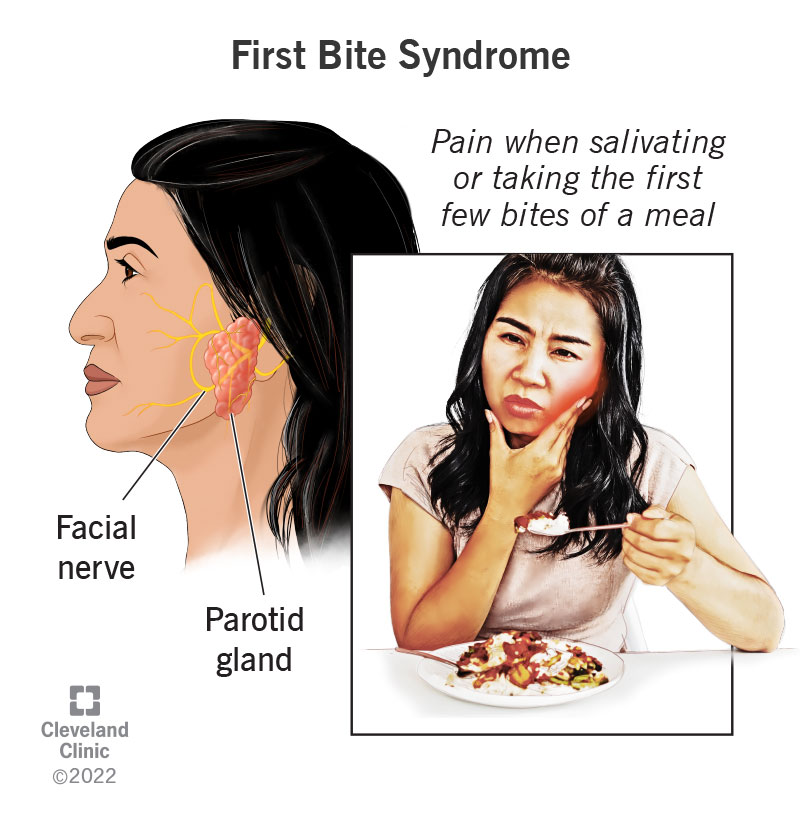First bite syndrome causes mouth pain when salivating or taking the first few bites of a meal. This condition is a potential side effect of some head and neck cancer treatments. Head and neck tumors can cause first bite syndrome, too. Treatments may include medications or botulinum toxin injections.
Advertisement
Cleveland Clinic is a non-profit academic medical center. Advertising on our site helps support our mission. We do not endorse non-Cleveland Clinic products or services. Policy

Image content: This image is available to view online.
View image online (https://my.clevelandclinic.org/-/scassets/Images/org/health/articles/24603-first-bite-syndrome)
First bite syndrome is a condition in which you experience mouth pain when salivating or taking the first few bites of a meal. As you continue to eat, symptoms go away. Discomfort typically develops near your parotid glands or along your lower jaw. First bite syndrome usually only affects one side of your face (it happens unilaterally). Many people describe the pain as a spasm or cramping sensation.
Advertisement
Cleveland Clinic is a non-profit academic medical center. Advertising on our site helps support our mission. We do not endorse non-Cleveland Clinic products or services. Policy
First bite syndrome doesn’t mean you have any additional health risks. However, it can certainly have a negative impact on your quality of life.
First bite syndrome may affect people who have:
People can develop first bite syndrome symptoms within days, months or even years after surgical treatment. Keep in mind, though — even if one or more of the above apply to you, it doesn’t necessarily mean you’ll get first bite syndrome.
Yes. While first bite syndrome is more common in people who’ve had surgery or cancer treatments for head and neck conditions, it’s a rare condition. The rarest type of first bite syndrome is idiopathic — meaning that it has no apparent cause.
First bite syndrome symptoms may include:
Experts believe that first bite syndrome is the result of nerve damage. This nerve damage may be the result of a head and neck tumor or a side effect after head and neck surgery.
Advertisement
A healthcare provider can diagnose first bite syndrome during an examination. They usually don’t need to run tests, especially if you developed symptoms after a head and neck surgery. They’ll ask about your symptoms and health history to confirm your diagnosis.
But if you develop first bite syndrome for no apparent reason, your healthcare provider might need to rule out other conditions, such as temporomandibular joint (TMJ) disorders.
In many cases, first bite syndrome symptoms go away on their own. So, your healthcare provider may choose to monitor your progress to see if treatment is even necessary.
If your symptoms come back (recur) or linger, first bite syndrome treatment may include:
Botulinum toxin (Botox®) is a neurotoxin that blocks certain chemicals from nerves. Injecting botulinum toxin into your parotid gland can reduce or eliminate first bite syndrome symptoms. It’s the most effective nonsurgical treatment for first bite syndrome. You may need more than one injection, and you’ll likely need injections every few months to maintain results.
In some cases, combinations of anticonvulsants (such as carbamazepine) and tricyclic antidepressants (such as amitriptyline) can reduce the duration and intensity of pain from first bite syndrome. But medication can’t cure it.
Research shows that pain relievers, including NSAIDs (nonsteroidal anti-inflammatory drugs), aren’t effective in the treatment of first bite syndrome.
Some people find relief by avoiding sour and acidic foods, which stimulate more saliva production. Additionally, chewing on the other side of your mouth that isn’t affected might ease your discomfort.
Radiation therapy
Radiation therapy isn’t a common treatment for first bite syndrome. But many people who’ve undergone radiation therapy to shrink a head and neck tumor have reported a reduction or total resolution of first bite syndrome.
If you’re unable to eat, or if you have severe pain, total parotidectomy (removal of your parotid gland) can be effective in treating first bite syndrome. This isn’t common and providers typically reserve it as a last-resort option.
Sometimes, first bite syndrome goes away on its own. But in some cases, symptoms can last a long time. This might affect your quality of life. There’s no way to know if or when your symptoms will get better, so ask your healthcare provider how to manage your condition in the meantime.
Because first bite syndrome is a side effect of head and neck tumors or cancer treatments, there’s nothing you can do to prevent it.
Advertisement
If you experience spasms, cramping or pain after taking the first few bites of a meal, talk to a healthcare provider. They can help confirm your diagnosis and determine appropriate treatment.
If you have first bite syndrome, you may want to ask your healthcare provider these questions:
First bite syndrome is a condition that can develop as a side effect of head and neck tumors or after head and neck surgeries and cancer treatments. It’s not dangerous, but it can have a negative impact on your quality of life. If you develop symptoms of first bite syndrome, tell your healthcare provider right away. They can help determine the cause and find ways to ease your symptoms so you can get back to enjoying life.
Advertisement

Sign up for our Health Essentials emails for expert guidance on nutrition, fitness, sleep, skin care and more.
Learn more about the Health Library and our editorial process.
Cleveland Clinic’s health articles are based on evidence-backed information and review by medical professionals to ensure accuracy, reliability and up-to-date clinical standards.
Cleveland Clinic’s health articles are based on evidence-backed information and review by medical professionals to ensure accuracy, reliability and up-to-date clinical standards.
If you have conditions affecting your ears, nose and throat, you want experts you can trust. Cleveland Clinic’s otolaryngology specialists can help.
